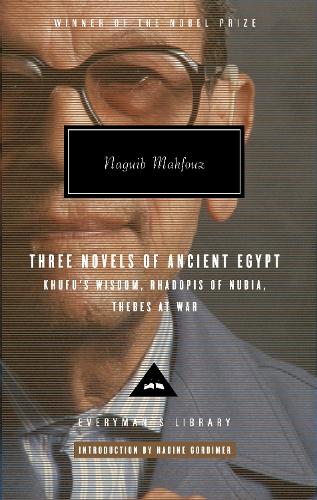
Three Novels of Ancient Egypt: Khufu's Wisdom, Rhadopis of Nubia, Thebes at War: Introduction by Nadine Gordimer
(Hardback)
Publishing Details
Three Novels of Ancient Egypt: Khufu's Wisdom, Rhadopis of Nubia, Thebes at War: Introduction by Nadine Gordimer
By (Author) Naguib Mahfouz
Introduction by Nadine Gordimer
Translated by Raymond Stock
Translated by Anthony Calderbank
Translated by Humphrey Davies
Random House USA Inc
Everyman's Library USA
27th March 2007
United States
Classifications
General
Fiction
FIC
Physical Properties
Hardback
648
Width 132mm, Height 208mm, Spine 36mm
686g
Description
From Nobel laureate Naguib Mahfouz- the three magnificent novels-published in an omnibus edition for the first time-that form an ancient-Egyptian counterpart to his famous Cairo Trilogy. Mahfouz reaches back thousands of years to bring us tales from his homeland's majestic early history-tales of the Egyptian nobility and of war, star-crossed love, and the divine rule of the pharoahs. In Khufu's Wisdom, the legendary Fourth Dynasty monarch faces the prospect of the end of his rule and the possibility that his daughter has fallen in love with the man prophesied to be his successor. Rhadopis of Nubia is the unforgettable story of the charismatic young Pharoah Merenra II and the ravishing courtesan Rhadopis, whose love affair makes them the envy of all Egyptian society. And Thebes at War tells the epic story of Egypt's victory over the Asiatic foreigners who dominated the country for two centuries. Three Novels of Ancient Egypt gives us a dazzling tapestry of ancient Egypt and reminds us of the remarkable artistry of Naguib Mahfouz.
Reviews
Mahfouzs characters blaze with intensity, his Egypt pulsates with unresolved tensions.
THE ATLANTA CONSTITUTION
Mahfouzs understanding of human psychology and history is profound.
THE BOSTON GLOBE
He is not only a Hugo and a Dickens, but also a Galsworthy, a Mann, a Zola, and a Jules Romains.
Edward Said, LONDON REVIEW OF BOOKS
Mahfouz is the single most important writer in modern Arabic literature.
NEWSDAY
A storyteller of the first order in any idiom.
VANITY FAIR
Through works rich in nuancenow clear-sightedly realistic, now evocatively ambiguousMahfouz has formed an Arabian narrative art that applies to all mankind.
The Swedish Academy, upon awarding Mahfouz the Nobel Prize in Literature
Author Bio
Naguib Mahfouz was born in Cairo in 1911 and began writing when he was seventeen. His nearly forty novels and hundreds of short stories range from re-imaginings of ancient myths to subtle commentaries on contemporary Egyptian politics and culture. Of his many works, most famous is The Cairo Trilogy, consisting of Palace Walk (1956), Palace of Desire (1957), and Sugar Street (1957), which focuses on a Cairo family through three generations, from 1917 until 1952. In 1988, he was the first writer in Arabic to be awarded the Nobel Prize in Literature. He died in August 2006.
